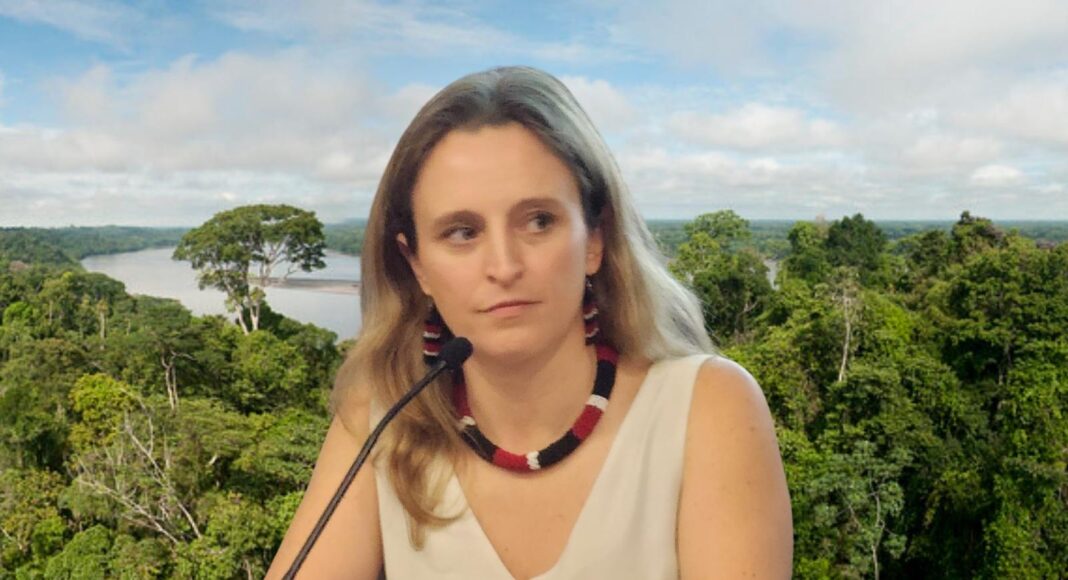During New York Climate Week 17-24 September 2023, Linda Etchart and James Thackara of Latin America Bureau spoke to Natalia Greene, member of the Executive Committee of the Global Alliance for the Rights of Nature (GARN) and Secretary of the International Tribunals for the Rights of Nature. Natalia was instrumental in bringing the Rights of Nature into Ecuador’s Constitution in 2008. This was the first time any country in the world had done so.
In this interview, Natalia recalls the history of the environmental movement in Ecuador in which she has played a key role. She then discusses the complexities of the current political situation, with regard to the divisions within and between the Indigenous-led party, Pachakutik, and CONAIE, the indigenous federations’ umbrella organisation who chose not to support any of the candidates in the 2023 elections. Natalia traces the country’s deteriorating security situation back to the policies of the Correa administrations 2007-2017 which allowed an expansion of the extractive industries and enabled local and international criminal cartels to infiltrate all layers of government and the economy, to the detriment of the wellbeing of Ecuador’s people and ecosystems. The interview was carried out in English.
LE & JT: Tell us how you became involved with the campaign to save Yasuní National Park
NG: I have been involved with environmental work for a long time. I did my thesis in political science back in 2005 at FLACSO [Ecuador] on Huaorani women in the Amazon. I was studying the politics of Yasuní; normally political science is based on political parties, but I was analysing the politics of Yasuní. I applied a gender perspective to how the Huaorani women have much more power than men ancestrally. But when the oil companies came to the territory, they just picked the men to negotiate with to gain access to the territory, so they could go and drill for oil. This changed the whole dynamic. I then met Professor Carlos Larrea, who said, ‘come and work with me’ … It was 2007. President Correa had come to New York to the UN to announce that he was going to leave oil in the ground, but he didn’t know how much money he should be asking for. Carlos Larrea and I conducted a study to figure out how much oil was in the ground, how much that meant in terms of carbon emissions, and started working on the Yasuní-ITT initiative [to halt drilling in the national park in exchange for financial support from outside the country]. That got me involved with Yasuní in general. This was 18 years ago.
When I became involved with the Rights of Nature movement, I worked with Roque Sevilla Larrea [Mayor of Quito 1998-2000], with my friend María Fernanda Espinosa [President of the United Nations General Assembly 2018 – 2019, Minister of Foreign Affairs, May 2017 – June 2018], and with Yvonne Baki [Former Minister of Foreign Trade and Ecuadorian Ambassador to the USA]. When President Correa stopped the initiative, I became a Yasunida. We formed Yasunidos to start a petition to save Yasuní. We joined the Rights of Nature movement and began working with the International Rights of Nature Tribunal to use this right as a tool to demonstrate the fraud that was being committed. Previously, in 2007 and 2008, I had been working in the Constituent Assembly on related issues, on oil, mining, fisheries, but the Rights of Nature was new. At that time, I was part of civil society, I was not the president of CEDENMA (Coordinadora Ecuatoriana de Organizaciones para la Defensa de la Naturaleza y el Medio Ambiente).
What was your role in bringing the Rights of Nature into the Ecuadorian Constitution?
I was working with Fundación Pachamama, which was a member of CEDENMA. CEDENMA had made a proposal for an environmental constitution. Many of the articles included in the Constitution, such as the In Dubio Pronatura precautionary principle, came from CEDENMA, of which I am now the Vice President. But the Rights of Nature was not one of them. That was something that we brought to the Assembly with Fundación Pachamama, to be honest, with the idea of opening up a debate, to say, ‘we are not separate from nature, we are part of nature. So how come nature doesn’t have rights?’ We saw this as an opportunity to include the Rights of Nature. But we didn’t imagine that it was going to be included. At the time we were emerging from a long period of political instability. The Texaco case was ongoing [the class action against Chevron following 20 years of oil contamination in Sucumbíos province]. We were starting the Yasuní initiative, we were beginning to understand the strength of our biodiversity. It was the right moment to include the Rights of Nature.
For the past 15 years I have been working on the Rights of Nature. We created the Global Alliance for the Rights of Nature in 2010 after we went to Cochabamba [for the World People’s Conference on Climate Change and the Rights of Mother Earth, 20-22 April 2010]. With regard to Ecuador, President Correa was never convinced about the Rights of Nature. The one thing I remember is that there was a meeting at which he said, ‘Let’s revise the stupid things that were accepted into the Constitution.’ And for him, the Rights of Nature was one of those stupid things. He was never convinced about it.
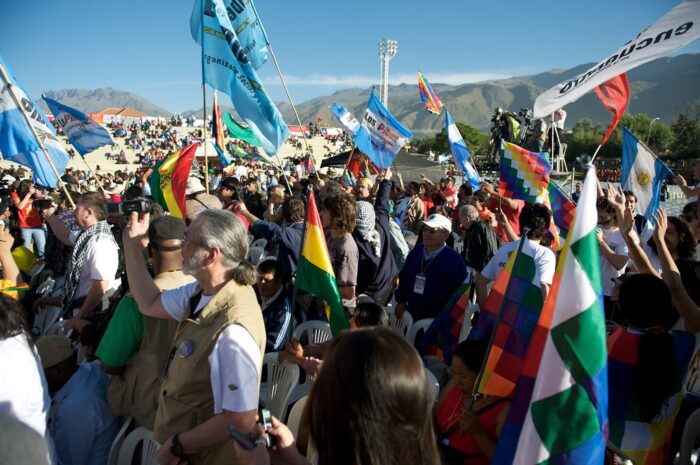
That’s why, while I voted the first time for Correa, after the [passage of the new] Constitution, from day one, we became his enemies, because anybody who was working for the environment was considered as the opposition. Immediately and unfortunately, throughout that time, we were persecuted as Yasunidos. We were persecuted in many ways: there was this secret intelligence [surveillance] around Yasunidos where they had all our names, our addresses, all our information. Random things, like I couldn’t use my account. For example, the SRI (Servicio de Rentas Internas) [the Ecuadorian tax authority], investigated me for five years. And my accountant said, ‘what are you involved with? Because I’ve never had a client who has been audited in such a way.’ Fortunately, I had all my paperwork organised when I was audited. I submitted everything and was fine, but it took me three months to be cleared, and that was not a coincidence. I couldn’t go to the Ministry of Environment, and I was the president of CEDENMA at that point. And if I wanted to make a request for information, I would have to sign it, and they wouldn’t accept my credentials. And they said, ‘Sorry, but when we enter your name, you are on the red list and we cannot accept any documents from you.’ We had all kinds of harassment like that, just because we were working for the Rights of Nature, and for the environment, and for Yasuní.
As I was telling you, I’m with CEDENMA and the Global Alliance for the Rights of Nature. You heard how big the Alliance has become, how many members we have, how we have expanded from being in one country, Ecuador, to having 35 countries upholding the Rights of Nature. The movement has grown very fast in Ecuador. We now have a local observatory: the Observatorio Jurídico de Derechos de la Naturaleza. The observatory has 65 ongoing cases around implementation of the Rights of Nature in Ecuador. We’ve seen a change, we are winning cases in court on behalf of the frogs and so on. That’s very powerful and great news. But yes, there are a lot of challenges…
First, the politics. Our governments, no matter if they are left or right-leaning, they all have an extractivist DNA. They all think that the solution for the country is getting money out of natural resources. They cannot think in terms of a post-extractivist country. We are running out of resources anyway. We have reached peak oil in Ecuador… Our demand for energy is going up and we have to start working on a post-extractivist economy for when we run out of oil. And the problem, unfortunately, is that everybody thinks ‘okay, when we run out of oil, then let’s move onto mining’. And I don’t think that they’re listening to the message of the [August 2023] consultations which resulted in a vote of 59 percent in favour of saving Yasuní [from oil drilling], and 69 per cent in support of the Quito sin Minería campaign [to keep mining out of the Chocó Andino Biosphere Reserve]. A large percentage of the population was saying, ‘we don’t want oil or mining, we want nature, we want a different model of development.’
And how do you see the current political situation?
We don’t want Correa to return. There’s evidence of corruption and [dodgy] contracts and everything that happened during Correa’s mandate. It’s not the elite, it’s especially social movements that don’t want him back because there was a lot of harm for civil society. During his time, many organisations closed: Pachamama was closed, Acción Ecológica was closed. The social movements really went down because people were afraid. If President Correa goes back to Ecuador, he’ll be jailed.
Many people who don’t want Correa back voted for Noboa. Noboa came to the debate and had an interesting angle on Yasuní, about how exploiting Yasuní is not economically viable. I think he gained a lot of votes because of that. He wasn’t taking an environmental perspective, but an economic perspective. He said, ‘this is not a good business for Ecuador.’ But I heard him say that to replace the money that could have come from Yasuní, we can expand mining. And you think, ‘what the hell? You have no idea.’
60 per cent of the voters in Ecuador are under 45. The youth in Ecuador is making the difference, as they want a different [economic] model. Unfortunately, the situation we are in right now regarding the drug trade is because Correa opened the doors to that. We didn’t have that issue before. We used to live in a very safe country. And now, what happened with [the 9 October murder of presidential candidate] Villavicencio, that’s scary.
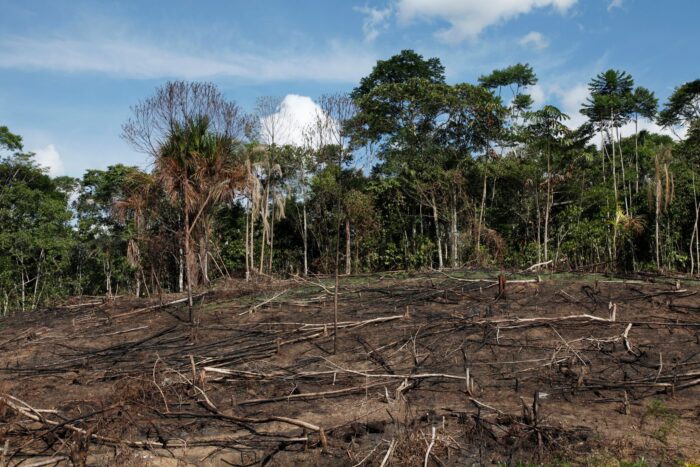
Can you tell us more about the drug trade in Ecuador?
I was always against having the [US military] base in Manta [near the border with Colombia], but it was key to controlling the drug trade. The base was closed down, and I was happy that it happened then. But I see the consequences now after [President] Lasso—although I don’t like him at all—tried to put a radar in place because we have small planes engaged in the drug trade. He tried to install a radar on a specific mountain in order to track the planes. The radar lasted for one day, even though it was guarded by the military. We know what’s happening, we know where the drug routes are. Ecuador is the country where drug trading is happening… And that is because we don’t have any control. And unfortunately, we have something called narco-politica. The drug trade, the cartels, are involved with politics. They’re financing the candidates, you know, there is corruption, which is scary.
Which politicians are associated with the drug trade?
I don’t know. Noboa has a lot of money from his family, so I’m not sure if he’s getting money from drug trading or not. But it has been proved that drug trading, drug money, has penetrated Rafael Correa’s political party [Revolución Ciudadana]. During his time, he allowed that to happen. He allowed the drug cartels to take over the country.
Why did Correa allow the drug cartels in?
Because they were financing this huge campaign. Luisa González’s [Revolución Ciudadana party] campaign spread all over the country. The campaign was huge. Who paid for that? There are studies of how much money was lost in corruption and how much was robbed during those ten years [of the Correa presidency]. It was happening on all levels. I’m not saying it was just Correa; he allowed it to happen with a huge bureaucracy and an institution that grew so much. There were enormous cases of corruption, financed by the cartels. Now we have a crisis with the prisons… massacres in the prisons…We now have migration out of the country. The poverty indexes have grown. And unfortunately, if you have unemployment, like more poverty, it’s easier for people who are unemployed and in a poor situation to be recruited. There are cities in Ecuador, such as Esmeraldas, that are very poor. And you see the sort of cars that are used by presidents around there. It’s obvious that it’s the drug cartels that are there. And that is a very recent phenomenon.
Tell us about the market for commodities such as gold, and the Chinese involvement in the economy.
Let me start with the Chinese companies. Before the Correa administration, it was prohibited to engage in a venta anticipada de petróleo, that is, pre-sale of oil. What did Correa do to get more resources? We cannot deny that during the time of President Correa, the reason that some people really loved him was because there was wealth: roads were built and the institutions got bigger. The price of a barrel of oil was $120. There was money coming from the venta anticipada of oil to China. Now, can we pay that oil back? There were hundreds and thousands of dollars in the economy, which made people feel that they were better off because they were in a better situation. But we’ve never gotten into as huge a debt as we did during this time.
Now we’re feeling the consequences of having left the door open to drug trading. For us in the environmental movement, we see the relationship with extractivism in a very close way, because right now, if you get gold, you can go to the central bank and the central bank will trade you dollars in exchange for gold, supposedly from legal mining. But that’s how illegally mined gold is laundered into legal gold, illegal minerals are laundered into legal gold and sold to the bank. It is the perfect scenario for the drug trade, because they can easily launder money. The mining is related to the drug trading. Under President Correa in 2009, the first mining law was passed to allow open pit mining. He opened up the mining sector to Ecuadorian and other companies.
Can you say more about the thousands of people in the country engaged in artisanal mining?
Right now you have tons and tons of people working in the mining sector, in illegal mining. But it’s not small-scale as it used to be. In Yutzupino [near Tena, in Napo province in the Amazon], we all knew that it was happening and we denounced it. You could see with drones 600 big excavators, each worth $200,000. It’s not like artisanal mining. The local government was involved. When the police came, they all [the miners] disappeared, because they told them that they were going to come. When you go now to Napo and to some other cities, you can see them [the excavators]. You can see they hide them, and you can see them inside their houses.
Do you think that Daniel Noboa will do anything about that?
I don’t know. I have no idea who Noboa is. I wish that Yaku [Pérez] was there. He could have won. He was terrible during the [presidential] debate, and that’s maybe why he didn’t win. Anybody could have won: many voters had not decided, and anybody could have won the second place. Noboa had 3 percent two weeks before so we were not even worried. We were thinking that Jan Topic [a right-wing candidate] was going to win, because he was all about security. And we’re living in insecurity all the time. I know that he [Noboa] is a very prepared person, that he’s studied. He’s very young. He’s 35. He’ll be the youngest president.
Does Noboa have support among the population?
No, he doesn’t have support. The fact is that people are opposed to Correa. People didn’t vote for Noboa, they voted against Correa… That’s what happened with Lasso: you have a president who has no legitimacy, because he had nobody behind him. Because everybody who was behind him was voting for him so that Correa would not come back.
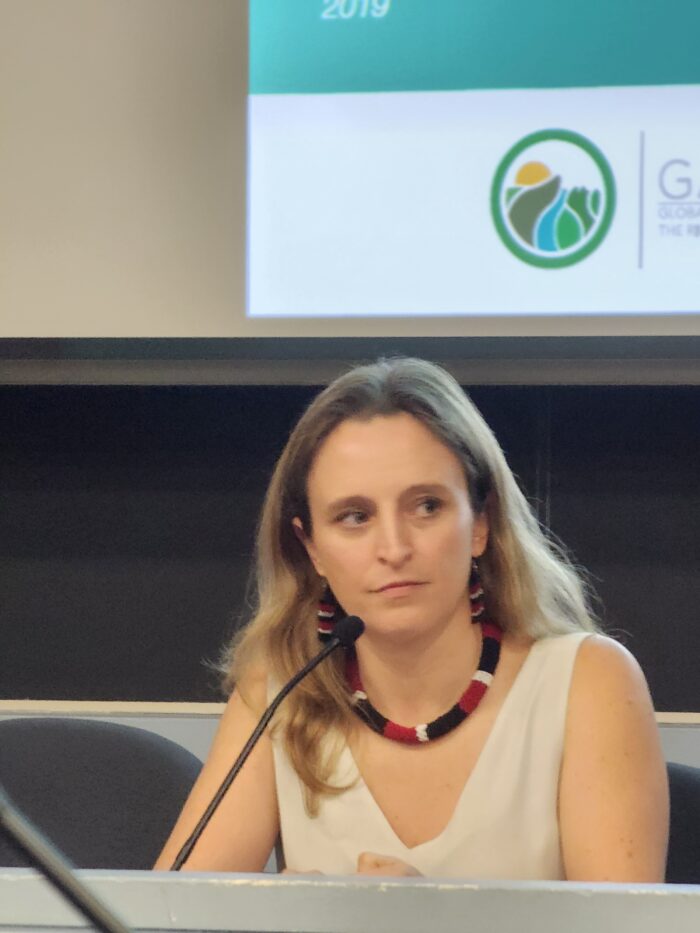
Why do you support Yaku Pérez? What is his relationship with CONAIE and its president Leonidas Iza?
What I like about Yaku [Pérez] is that he was proposing to be the third way. He was not the elite or the bankers. He was not Correa, and he was proposing to be a third way through ecology. And he was the best candidate talking about the Rights of Nature, which he understands. He’s been a judge on our [International Rights of Nature] tribunals. He understands Yasuní, he lives that. So that’s why I was hoping that he would win. But then he didn’t. One of the reasons that I feel that he didn’t was because of the division with CONAIE, because CONAIE started a campaign against Yaku from the very beginning. Why? Because they’ve had a very bad relationship. Yaku and Leonidas Iza don’t get along at all. What happened is there was some kind of electoral fraud in the 2021 elections. He [Yaku] should have been there instead of Lasso. There was a division with Pachakutik [the Indigenous people’s party], and Yaku left Pachakutik. For that reason, some thought that he was a traitor, and they didn’t support him. Leonidas Iza was going to run for president [in 2023]. He didn’t end up running, but he did not support Yaku either.
What was the fraud?
During the last elections, Yaku was expected to come in second, and then the lights went off and Lasso came second. Unfortunately, I feel that Pachakutik lost an opportunity, because Pachakutik had many [National] Assembly members. They were the second strongest political party in the Assembly. They could have done an amazing job. But there were all these corruption problems. The president of the Assembly was from Pachakutik. She was expelled, and Pachakutik was divided. I feel that they didn’t put up people that were prepared, because they didn’t think that they were going to win.
And where does Marlon Santi (Sarayakan Achuar/Kichwa president of Pachakutik) fit into this?
Marlon. I feel that he has had a very good role, you know, because he’s been keen on understanding what’s right and what’s wrong. He’s been denouncing Correa. He’s been denouncing even sometimes, I cannot assure you of this, but sometimes Leonidas Iza. We don’t know if Iza is funded by, or if he’s close to, some Correistas. Maybe not to Correa, but to some Correistas. Marlon Santi has denounced that. And Marlon at the end also supported Yaku Pérez. I feel that, in the end, it doesn’t matter who’s the Indigenous candidate. If you have an Indigenous candidate, Pachakutik should support them, CONAIE should support them. So Pachikutik supported Yaku, but CONAIE did not. You can see the political divisions.
Will Pachakutik rise again?
I hope so. I really hope that that Pachakutik can recover the strength that it had. And Pachakutik is a political arm of CONAIE. But not now. They lost the opportunity. Even now we’re getting so few votes for Yaku.
How do you feel about Ecuador’s present situation?
Before, as I was telling you, we were persecuted by the tax department, but who cares about that? I presented my documents, and everything was fine. But nowadays things are resolved in Ecuador by killing. [Presidential candidate Fernando] Villavicencio was denouncing the oil contracts and the corruption, especially of former President Correa, and he got killed. I don’t think that it was Correa, because it would have been very stupid of him, because it affected his candidate [Luisa González]. But Correa many times said to Villavicencio, ‘your days are numbered.’ He [Correa] said many times that vengeance was coming and now he [Villavicencio] has been killed.
So when Luisa was on the streets, they were calling her a murderer. It was a really strong line in the press. I don’t feel that we have reached that point, but the rising levels of insecurity, of poverty, of delinquency in general, of crime and of drug trading, is a ticking time bomb, you know, it’s huge and terrible, and a really strong combination. The guy who killed Villavicencio, who was later killed, was an 18-year-old from Colombia. He was a father when he was 15. He was in prison when he was 16 and 17. He had come out of prison. They believe that he was paid $1,000 to kill Villavicencio. People are willing to kill for that much money because of the rising levels of poverty and unemployment.
Will Daniel Noboa do anything about that?
I hope so. But this is the first time that I feel that the consequences could be worse and for that, I’m afraid.
Linda Etchart is a lecturer in Human Geography at Kingston University London, and a regular contributor to Latin America Bureau’s Environmental Defenders Series. Her publications include Global Governance of the Environment, the Rights of Nature and Indigenous Peoples: Extractive Industries in the Ecuadorian Amazon (Palgrave Macmillan, 2022).
James Thackara is an author and Indigenous rights activist. He is a contributor to Latin America Bureau publications.
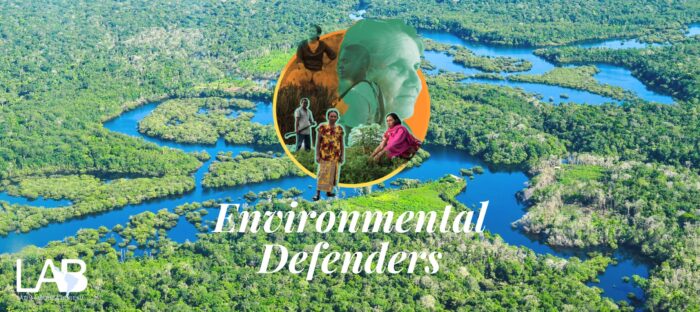
LAB’s Environmental Defenders Series documents some of the work of environmental defenders in different Latin American countries, highlighting both the dangers they face and their achievements in defending their habitats and communities.
We aim to inform, motivate and connect an English-speaking public with the inspirational stories of grassroots Environmental Defenders’ work in Latin America and give EDs from countries where their battles are under-reported a greater voice.
We are working in partnership with trusted Latin American independent outlets. Find a full list, as well as further details of the series, here. Help us bring these stories to a wide audience by sharing them widely on social media.

